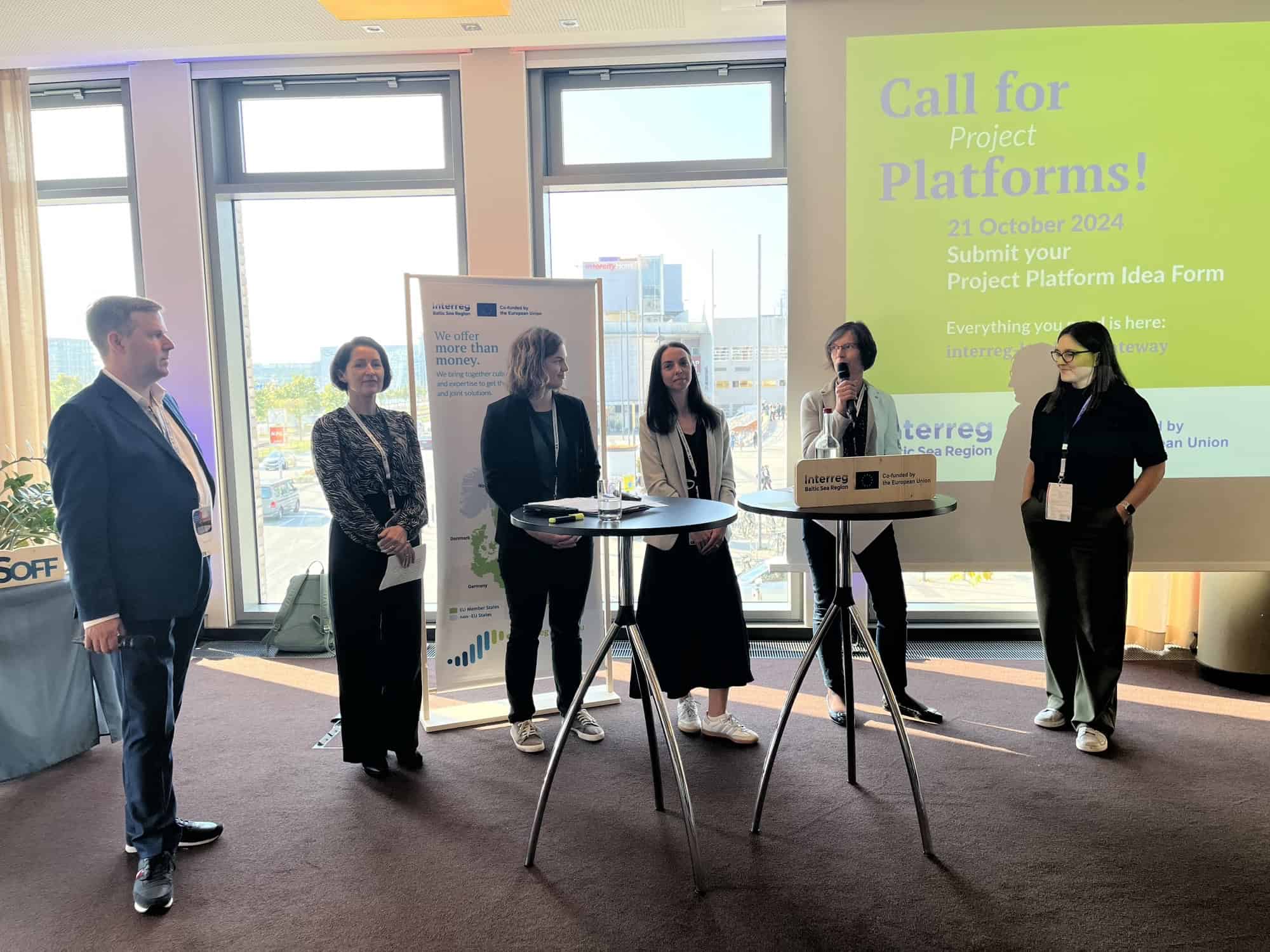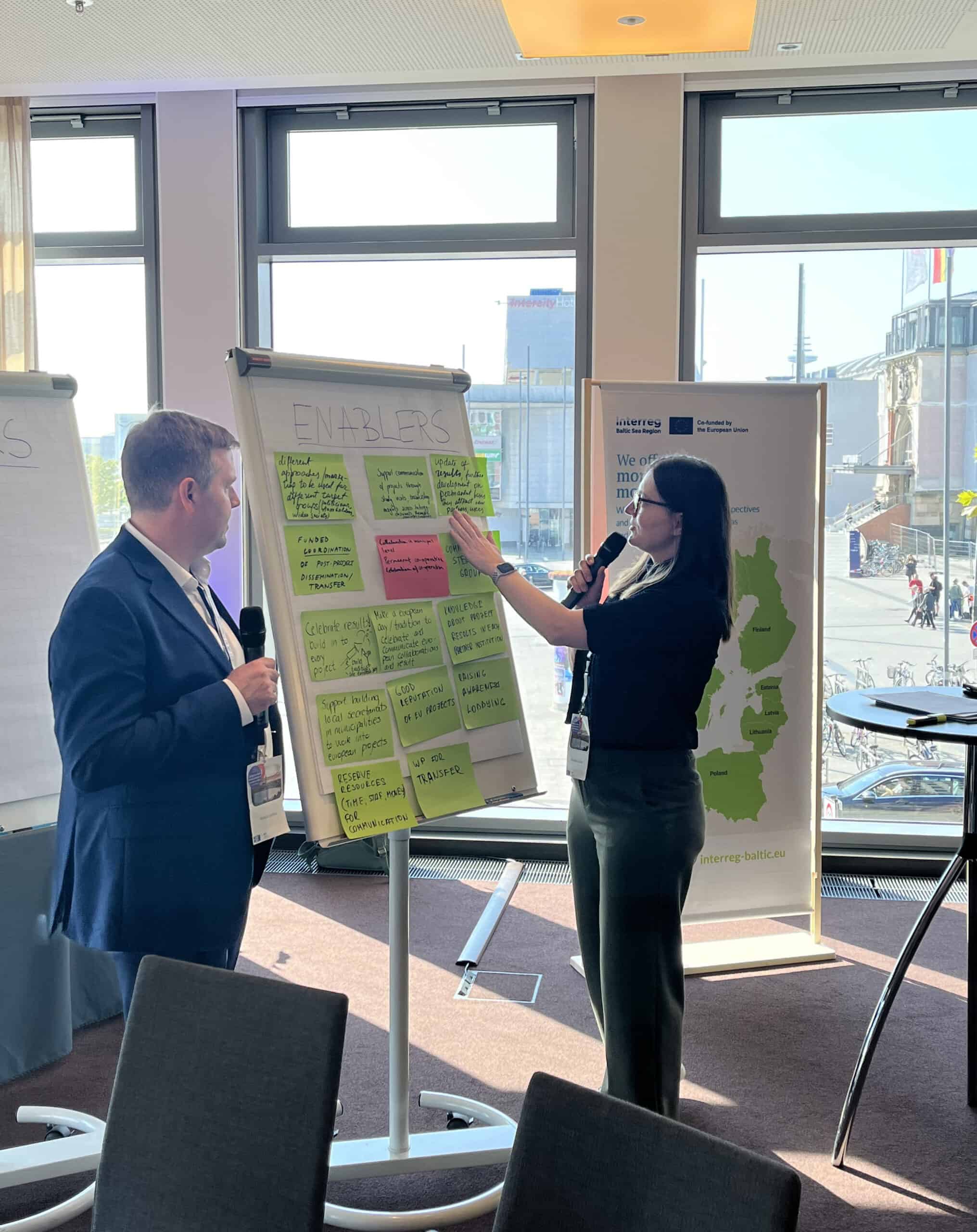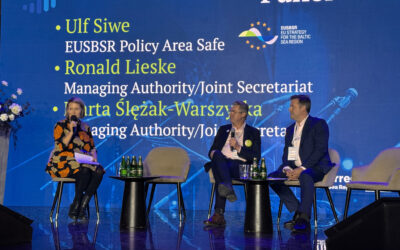
4 October 2024
Committed to the region, together!
Written by Eleonoora Väänänen
The Kiel Fjord glittering in the sunshine, ships sounding their horns and seagulls squawking provided yet another perfect Baltic Sea backdrop for the 32nd Annual Conference of the Baltic Sea States Subregional Co-operation (BSSSC) on the 19-20 September 2024. On 20 September, the Interreg Baltic Sea Region team organised a workshop at the conference.
BSSSC annual event in Kiel
The Baltic Sea States Subregional Co-operation (BSSSC) is a political network of regional authorities from all countries in the Baltic Sea region with a history of more than 30 years. Schleswig-Holstein, which holds the presidency in 2024-2025, organised a two-day annual event in Kiel on 19-20 September 2024. The event focused on how to strengthen Baltic Sea societies, democracy and the economic system in politically challenging times.
Interreg Baltic Sea Region was present as a Programme with its own workshop and with several of its projects, e.g. in the fields of munitions clearance, hydrogen initiatives and renewable energy. A special presentation was given to the BSR Cultural Pearls project, which showcases how culture can make cities stronger, more lively and resilient. The participants of the BSSSC annual event enjoyed an entertaining and heartwarming evening presented by the city of Kiel as one of four BSR Cultural Pearls in 2024. It was a powerful demonstration of how young people from different social groups can become part of the rich cultural life of a city.
From project to platform: Impulses for sustaining and capitalising on results from projects
The aim of the workshop was to discuss how to preserve project results beyond the 2-3 year lifespan of projects and to make sure results reach a wider range of actors who may benefit from them or spread them further. The workshop was run by Orsolya Schulz and Ronald Lieske from the Managing Authority/Joint Secretariat of the Interreg Baltic Sea Region Programme.
To begin with, Orsolya and Ronald presented the possibilities that the Interreg Baltic Sea Region Programme offers for making sure that project results can be made use of even after the projects come to an end. In the Interreg Baltic Sea Region Programme, these possibilities include not only a specific work package for transfer activities as part of the project plan or support for the Member States of the Programme area for communication activities, but also, in particular, the so-called project platforms.
What are project platforms and what can they be used for?
In project platforms, several projects from Interreg Baltic Sea Region and other funding programmes from a similar thematic field can come together to join their forces, and apply for funding from the Interreg Baltic Sea Programme. The project platforms allow representatives from several different projects to consolidate, pool and promote project outcomes together vis-à-vis their target groups and decision-makers. The project platforms actively trigger knowledge transfer and shape policies. This way, the work undertaken by individual projects can benefit the whole region on a wider scale. A call for project platforms is currently open, with project platform idea forms due on 21 October 2024.

After Orsolya and Ronald had set the scene, a panel discussion followed. Four panellists representing both projects and regions presented inspiring examples of how they have facilitated the uptake of project results. The panellists agreed that the project platforms offer a great chance for capacity building and exchange of best practices. In terms of the thematic scope, in contrast to individual projects that focus on very specific challenges, the project platforms are often more complex. They often address the same or similar challenges from several different angles, for example across different sectors of the economy. In addition, the panellists emphasised how important it is to think about what kind of change it is that the platform wants to create and which actors have the actual mandate to bring by that change and whether they could also become members of the platform.
At the end of the workshop, the participants were divided into groups to discuss enablers for getting to know project results. The role of communication, active and committed regional level as well as chances for low-threshold get-togethers between the projects were among the enablers that gained several mentions.
To conclude, as one participant aptly put it, “Interreg gives the local level the chance to be European” – and the project platforms can be used to help sustain and multiply this effect.
More recent news
Climate-neutral future at hand for Baltic Sea region cities
Turning a city into a climate-neutral one requires knowledgeable people, thorough planning and solid financial resources. But how can cities manage this transition smoothly? The Interreg project Climate-4-Case guides cities around the Baltic Sea on how to do that right.
Designing Interreg Baltic Sea Region that belongs to everyone
10 December 2025 Designing Interreg Baltic Sea Region that belongs to everyone Written by Eeva Rantama What if the next Interreg Baltic Sea Region...
Monitoring the Programme’s progress: transnational cooperation in the making
Representatives from nine Programme area countries gathered in Berlin on 19-20 November 2025 to review the progress of the Programme’s implementation and start preparing for the post-2027 period.
Beyond Borders: Turning Interreg Results into Policy Action
At this year’s EUSBSR Annual Forum in Sopot, the session “Beyond Borders: Interreg Results in Action for a Resilient and Safe Baltic Sea Region” showcased how Interreg Baltic Sea Region projects are transforming challenges into policy-relevant results that strengthen resilience, safety, and cooperation across the region. The session brought together project partners, EUSBSR policy area coordinators, members of the Programme Monitoring Committee and young participants to explore what it takes to turn project outcomes into lasting policy impact.






